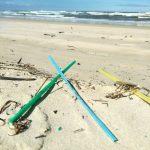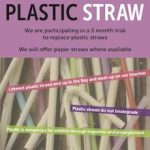The Last Straw – Port Phillip SRP
Source Reduction Plan (SRP) Overview
Name of SRP
Partners Delivering the SRP
- Tangaroa Blue Foundation
- Port Melbourne Business Association
- Local Beach Patrol
- The Port Phillip EcoCentre
- and more
Location
City of Port Phillip (CoPP)
Photo 1
Evidence of the issue

Photo 2
Evidence of SRP resources

Photo 3
Evidence of positive outcomes
Overall Goals & Background
Targeted Debris
Plastic Straws
Plastic straws are a common type of litter in the City of Port Phillip.
Why is the SRP needed?
As a result of the City of Port Philip (CoPP) Source Reduction Plan workshop in 2017, there was a clear community concern to reduce this form of marine debris.
Participants wanted to use the template from The Last Straw and implement it locally. The project objective was to reduce plastic straw litter by engaging with cafes and bars in the City of Port Philip and replacing their plastic straws with paper ones, to reduce the impact of straw pollution.
Logistics
Timeline and Project Goals
2017/2018 – Initial 3-month trial
Ongoing – similar initiatives launched by Port Phillip Council
Measuring Success
A representative from Beach Patrol (a local community group that targets marine litter) approached 9 cafes to take part in a trial of replacing plastic straws with paper ones (supplied by the project) for 2-3 months, followed by a cost-benefit analysis. Each café agreed to take part.
Each café was given 1000 paper straws, 3 x A5 flyers outlining the initiative and trial, and asked to place the straws out of sight – only offering the paper straws when requested.
Extra funding was harnessed from Beach Patrol and Port Philip Council to purchase more paper straws so a further 6 cafes were brought on board.
Data Collection & Reporting
Exposure for participating cafes was done by taking photos of the café staff holding a cup of paper straws with the café name on one of their boards in the background. These pictures were posted on Instagram and Facebook with a #lastplasticstraw hashtag.
Results and Reflections
Positive Outcomes
A local newspaper article highlighted the initiative and created more positive press for those participating establishments.
Overall, most cafes (3/4) were happy to continue to use paper straws provided a reliable stockist was put forward.
Funding
Extra funding was harnessed from Beach Patrol and Port Philip Council to purchase more paper straws so a further 6 cafes were brought on board.
Challenges & Improvements
The project did encounter some challenges along the way, larger cafes went through their supply much faster, and if the project team did not continue to supply paper straws they would default back to plastic as demand warranted. This meant more time spent visiting cafes every 2 weeks and following up than anticipated.
Also, café staff are very time-poor so sometimes didn’t hide the straws as requested. It is more efficient to simply provide straws with drinks so that staff do not have to revisit tables repeatedly, even though hiding straws drastically reduces costs.
Future Opportunities
This model is now being rolled out in other Phillip Bay council areas.

